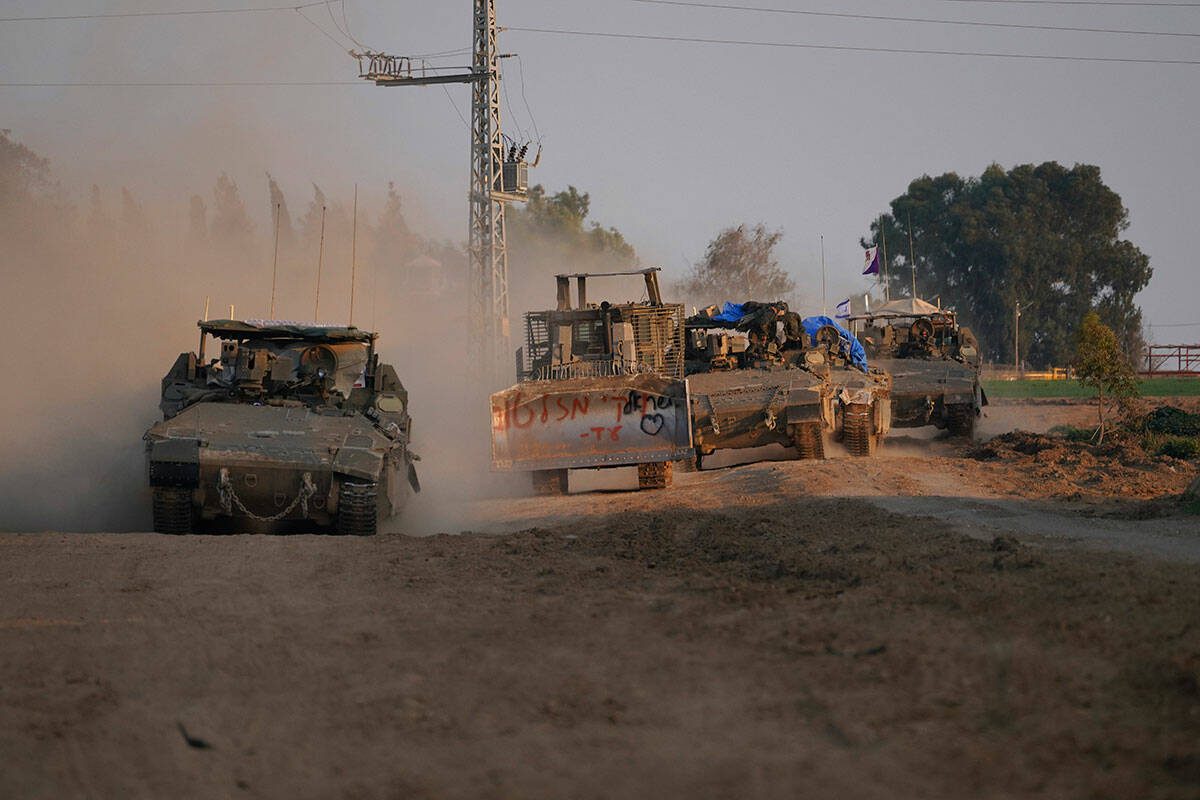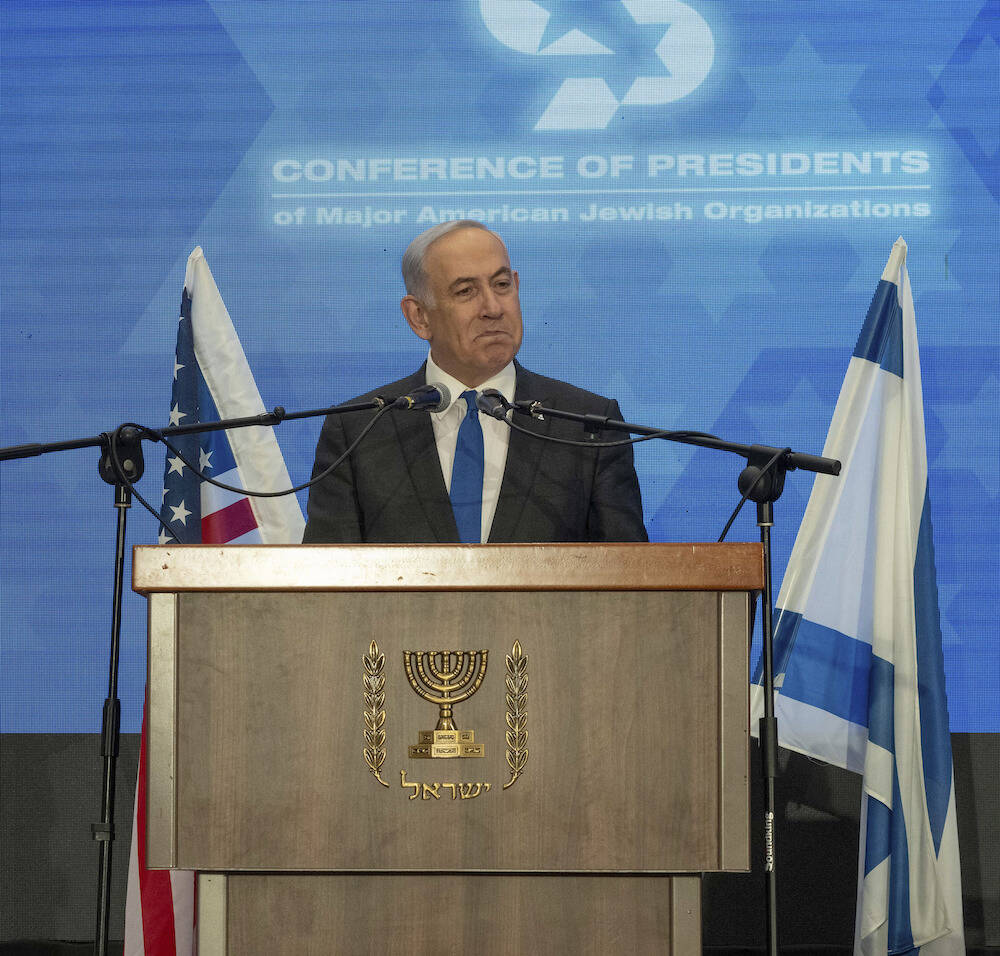Netanyahu: Israel will ‘finish the job’ inside Gaza
RAFAH, Gaza Strip — Israeli Prime Minister Benjamin Netanyahu on Sunday brushed off growing calls to halt the military offensive in Gaza, vowing to “finish the job” as a member of his War Cabinet threatened to invade the southern city of Rafah if remaining Israeli hostages are not freed by the upcoming Muslim holy month of Ramadan.
Israel’s government has not publicly discussed a timeline for a ground offensive on Rafah, where more than half the enclave’s 2.3 million Palestinians have sought refuge. Retired Gen. Benny Gantz, part of Netanyahu’s three-member War Cabinet, represents an influential voice but not the final word on what might lie ahead.
“If by Ramadan our hostages are not home, the fighting will continue to the Rafah area,” Gantz told a conference of Jewish American leaders. Ramadan, expected to begin March 10, is historically a tense time in the region.
As cease-fire negotiations struggle after signs of progress in recent weeks, Netanyahu has called demands by Gaza’s ruling Hamas terrorist group “delusional.”
The United States, Israel’s top ally, says it still hopes to broker a cease-fire agreement and hostage release between Israel and Hamas, and envisions a wider resolution of the Israeli-Palestinian conflict. Netanyahu has rejected U.S. and international calls for a pathway to Palestinian statehood.
His Cabinet adopted a declaration Sunday saying Israel “categorically rejects international edicts on a permanent arrangement with the Palestinians” and opposes any unilateral recognition of a Palestinian state, which it said would “grant a major prize to terror” after the Oct. 7 attack that triggered the war. The surprise invasion by Hamas killed about 1,200 Israelis, mostly civilians, and more than 250 people were taken hostage. Terrorists still hold around 130 hostages, a fourth of them believed to be dead. Most of the others were released during a weeklong cease-fire in November.
Netanyahu has pushed back against international concern about a Rafah offensive, saying residents will be evacuated to safer areas. Where they will go in largely devastated Gaza is not clear.
An airstrike in Rafah overnight killed six people, including a woman and three children, and another strike killed five men in Khan Younis, the main target of the offensive in southern Gaza in recent weeks. Associated Press journalists saw the bodies arrive at a hospital in Rafah.
In Gaza City, which suffered widespread destruction in the initial weeks of the war, an airstrike flattened a home, killing seven people, including three women, according to Sayed al-Afifi, a relative.
Israel’s military rarely comments on individual strikes and blames civilian casualties on Hamas because the terrorists operate in dense residential areas.
In the occupied West Bank, a shootout erupted when Israeli forces went to arrest an armed suspect in the town of Tulkarem. The military said the suspect was killed, and a member of Israel’s paramilitary Border Police was severely wounded. It described the target of the raid as a senior terrorist. The Palestinian Health Ministry said two Palestinians were killed.
U.N.: Hospital no longer functions
The head of the World Health Organization said the main medical center serving southern Gaza, Nasser Hospital, “is not functional anymore” after Israeli forces raided the facility in Khan Younis last week.
Tedros Adhanom Ghebreyesus said a WHO team was not allowed to enter Nasser Hospital on Friday or Saturday to assess patients and critical medical needs. In a post on X, he said about 200 patients remain, including 20 who need urgent referrals elsewhere.
Israel says it arrested over 100 suspected terrorists there, including 20 who it says participated in the Oct. 7 attack. The military says it is looking for the remains of hostages inside the facility and does not target doctors or patients.
Ruth Munder, freed by Hamas last year, told Army Radio she was kept on the second floor of Nasser Hospital with other hostages.
The war has killed at least 28,985 Palestinians, mostly women and children, according to the Health Ministry, which does not distinguish between civilians and combatants in its records. On Sunday, it said 127 bodies were brought to hospitals in the past 24 hours.
U.S. opposes cease-fire resolution
Algeria, the Arab representative on the U.N. Security Council, has circulated a draft resolution demanding an immediate humanitarian cease-fire and unhindered humanitarian access to Gaza, and rejecting the forced displacement of Palestinians.
U.S. Ambassador Linda Thomas-Greenfield said the draft “will not be adopted” and runs counter to Washington’s efforts to end the fighting.
“It is critical that other parties give this process the best odds of succeeding, rather than push measures that put it — and the opportunity for an enduring resolution of hostilities — in jeopardy,” she said.
The U.S. has vetoed previous resolutions that had wide international support. President Joe Biden has bypassed Congress to rush arms to Israel while urging it to take greater measures to spare civilians and facilitate the delivery of humanitarian aid.
The U.S., Qatar and Egypt have spent weeks trying to broker a cease-fire and hostage release, but there’s a wide gap between Israel and Hamas’ demands. Qatar said Saturday the talks “have not been progressing as expected.”
Hamas has said it will not release all remaining hostages without Israel ending the war and withdrawing from Gaza. It also demands the release of hundreds of Palestinians imprisoned by Israel, including top terrorists.
Netanyahu has publicly rejected the demands and any scenario in which Hamas would rebuild its military and governing capabilities. He said he sent a delegation to cease-fire talks in Cairo last week at Biden’s request but doesn’t see the point in sending them again.
In an interview with Israel’s Kan public broadcaster, Netanyahu’s national security adviser Tzachi Hanegbi said military pressure and sticking to a strict line in negotiations could lead Hamas to drop its “absurd demands.”
Netanyahu also opposes Palestinian statehood, which the U.S. calls a key element in broader vision for normalization of relations between Israel and regional heavyweight Saudi Arabia.























